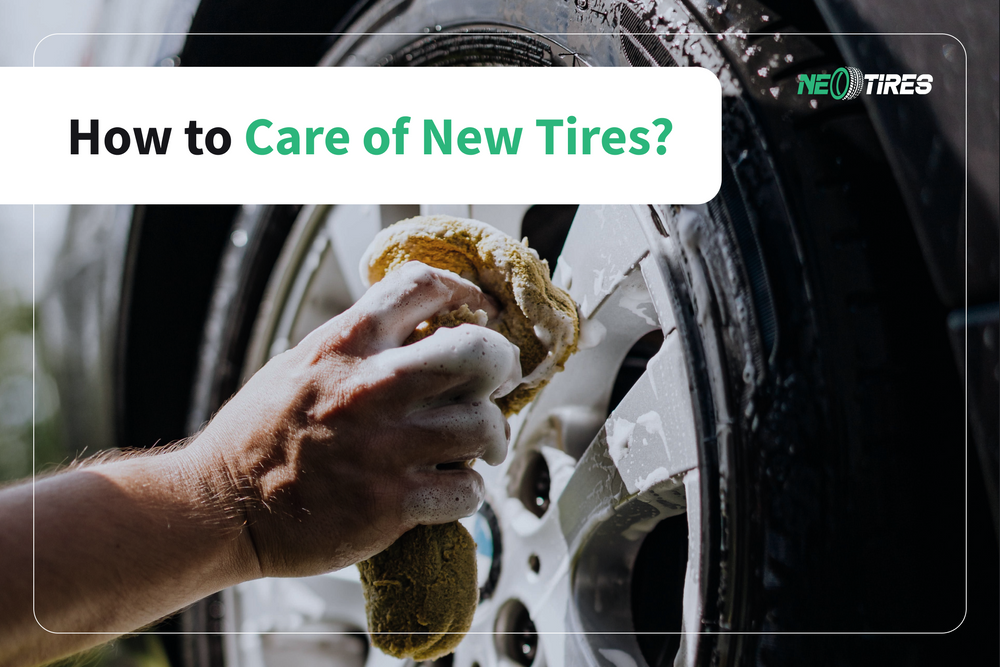When car enthusiasts buy a new car, they pay attention to everything, except the tires. For some reason, tires begin receiving attention precisely when something goes wrong. Either the traction of the vehicle decreases, or the engine begins to consume more fuel. In such situations, drivers ask themselves whether the issue is or is not related to the tires. Well, it is. And the way we take care of them directly contributes to the way the car behaves.
The beautiful part of things is that with minimal, but sufficiently high-quality care, the tires promise to serve without problems for many years to come. And if the maintenance of mechanical systems requires a service appointment, tire maintenance can be done at home.
How To Take Care Of Your New Tires?
You may have recently bought a set of brand-new tires. You are sure that your car will provide better traction, a more stable grip, and smoother comfort. And you are perfectly right, as long as you have opted for the right tires considering the car's weight and its type of traction. Now the question is how to preserve these properties without the tires being worn earlier than expected.
So, yes, new tires also need care and maintenance, and not just used ones. Caring for your set of new tires prevents premature wear and ensures the stability of the vehicle on the road. None of us wants the tires to start to mess up after just one year. So, what should we do to keep new tires in optimal condition? You will find out right in this article. Here you will get to know some basic terms that you should never ignore if you truly care about your tires. So, take them into account to benefit from their best possible performance.
Review Your Driving Habits
We do not rule out that you will want to test your new tires to the max. With this in mind, you will probably want to feel some adrenaline in your veins and you will be tempted to mash the gas pedal as hard as possible to test the reaction of your tires. However, with this action, you are only gnawing the outer layer of the tire treads, including the sidewalls, which will begin the process of their damage. I'm sure your new tires will be up to the challenge, don't even doubt it. However, do not think that these actions will not remain without consequences on the integrity of your tires.
If your goal is to keep your tires in optimal condition, review your driving style. Adopt a careful style especially when braking and cornering. Reduce speed long before the pothole you spot on the road. Avoid subjecting the tires to additional stress because it is often unnecessary. Your new tires are capable of a lot, but that doesn't mean they remain unaffected if you test their potential from the very first days.
Check The Pressure In Your New Tires
Many car lovers mistakenly believe that if the tires are new, they cannot undergo pressure deviations. They are so wrong! New tires, even if they are still under warranty and in ideal condition, are prone to pressure fluctuations anyway. Even temperature changes can affect the tire condition. So, there is no argument and no excuse to disregard this aspect. Once you avoid pressure checking, they may undergo underinflation. You don't want to find yourself with a flat tire. One of the tires' fiercest enemies is uneven wear as a result of under-inflation. Uneven wear leads to instability of the vehicle on the road, higher consumption of fuel, and more impaired traction.
Make sure that the pressure level is equal to the 4 tires and coincides with the level recommended by the manufacturer every month. If you haven't bought a pressure gauge yet, maybe it's time to consider one, because this tool helps you keep things under control when you have nowhere to check the pressure.
Tire Alignment Is A Must
Wheel alignment is a term you will have to get used to. This ensures the correct positioning of the wheels on the road and to each other. For this procedure, you will need to contact the mechanic who will inspect the existing angles and correct them if there are irregularities. A potential misalignment leads to a chain of negative consequences on the tires as well as on the entire suspension system. One of the most common consequences is uneven tire wear, which you already know is not particularly beneficial.
The signs that suggest a possible wheel misalignment are pulling to one side as well as vibrations in the steering system. These symptoms can occur regardless of whether you have new or old tires. In the same context, I would like to mention that you should not wait for these symptoms to appear to get the car to an alignment inspection. In many cases, misalignment is asymptomatic and you can barely deduce that something is wrong. Especially if you are not an experienced driver.
So, to protect your tires, be aware of this potential problem and inspect the angle of the wheels regularly. The regularity of the procedure is at your discretion because no law obliges wheel alignment with regularity. However, specialists recommend a checkup from 6 to 12 months to avoid the issue getting worse.
Tire Rotation Is As Important As Wheel Alignment
Another important term is tire rotation. It is a simple procedure but extremely important and mandatory if you want to enjoy the optimal condition of your tires. The mechanics rotate the tires depending on the type of traction of the car. They change them either parallel, perpendicular, or X-shaped to even out the wear of the 4 tires.
Many drivers take advantage of the moment when they change the car's oil and rotate the tires at the same time. You can do it as you like, the important thing is not to skip this step. If the tires do not change their position on the axles of the car, the consequences are not very good. Tires wear unevenly which leads to: increased pulling; delayed response to tasks like braking, cornering, and accelerating, steering vibrations, poor vehicle handling, and many more.
New Tire Maintenance: FAQs
How Do You Take Care Of A Brand New Tire?
Even if many ignore this aspect, new tires do need care right from the moment they start rolling on the road. These 5 rules will help you keep your tires in optimal condition so that they serve for a long time:
- Be careful with your driving style. Control the speed and avoid aggressive maneuvers to protect your tire tread;
- Make sure that the pressure in new tires is within the recommended limit;
- Do not neglect the importance of rotation and alignment with new tires;
- Choose carefully the roads you drive on;
- Regularly inspect the condition of new tires for damage signs.
Do I Need To Do Anything After Getting New Tires?
When installing new tires, we recommend asking your mechanic for a wheel alignment. It is possible that with old tires, the alignment of the wheels could deviate slightly. With a wrong alignment, new tires could undergo uneven wear. In this sense, the alignment would give you the certainty that you will benefit from the new tires' full potential without anything interfering with their performance. Alignment is not an absolute must with the new tires, but rather a "highly recommended" thing.
What Not To Do With New Tires?
According to the Continental reputable tire maker, it would be good to avoid using lubricants on new tires. More precisely, it is about those lubricants that are usually used to facilitate the mounting of tires on rims. In the case of new tires, these lubricants could increase the risk of slippage between the tire and the rim. This could lead to risks during driving or braking. Specialists recommend avoiding the use of these substances for at least a few hundred miles after mounting new tires.
Do New Tires Make Noise Until Broken In?
In general, you can expect some humming noise with new tires. But don't worry. This is something normal because new tires need some time to settle in. Still, a lot depends on the type of tires and their noise suppression technologies. Low-budget tires might remain a bit noisier after some mileage simply because they do not have sound-suppressing features.
Is It Safe To Drive With New Tires?
Each tire is unique in its own way and behaves differently from others. Thus, you may feel a different driving style with the new tires than with the previous tires. The new tires might brake more agilely or less agilely, they might be more stable or less stable in corners, and they might accelerate more tenaciously or lazier than the previous ones. So, we recommend that you take some time until you resonate with them and understand their specifics and behavior. During this time, we recommend that you drive carefully for the first hundreds of miles. They need some time to settle in and you need some time to get to know them. Don't drive with them the same way you did with your previous tires. You might lose control and not estimate the driving conditions correctly.
Why Trust Us?
Each tire is unique in its own way. Depending on the construction and design of various tires, the driving experience can be exceptional or downright terrible. For this reason, choosing the right tire is one of the most important aspects.
NeoTires is here to help you with this not-so-easy task. Our extensive experience in the tire industry is a good reason to count on us. We know this "kitchen" down to the smallest details and know how to match every driver's needs with the right tires.
Our team includes experts, trained enthusiasts, and qualified specialists who know everything from tire construction to their performance in various conditions. Regardless of whether it's the rockiest terrains, the muddiest road conditions, or the harshest snow, we know which tires do the best.
So, feel free to ask any questions. We will be happy to assist you and provide you with a wide range of products for various needs. A nice bonus is our prices, which, by the way, are among the most advantageous out there. Drive safe and choose your tires wisely!





